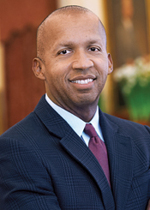“Just Mercy: Confronting Mass Incarceration
and Excessive Punishment in America”
4 p.m. Oct. 31, 2014
Gordon Dining and Event Center
RSVP by Oct. 27, 2014
Public interest attorney Bryan Stevenson wants to talk about injustice.
As founder and executive director of the Alabama-based Equal Justice Initiative, Stevenson works with clients who have been wrongfully convicted or denied adequate legal representation — and who, in large numbers, come from poor communities and communities of color. He says that, more than guilt, factors like race and poverty shape his clients’ experiences in the criminal justice system.
“The United States now has the highest rate of incarceration in the world. We have seven million people on probation and parole,” Stevenson told a TED Talk audience in 2012. “And mass incarceration, in my judgment, has fundamentally changed our world. In poor communities, in communities of color, there is this despair, there is this hopelessness, that is being shaped by these outcomes.”
Here in Wisconsin, the prison population has more than tripled since 1990. And while the state’s total incarceration rate is similar to the national average, with regards to men of working age, Wisconsin is more likely to incarcerate African Americans and Native Americans than any other state in the nation. In fact, according to a UW-Milwaukee study published last year, Wisconsin’s incarceration rate for black men is nearly double the U.S. rate.
Stevenson hopes to deepen Wisconsin’s conversation on injustice on Oct. 31, when he presents “Just Mercy: Confronting Mass Incarceration and Excessive Punishment in America” at the University of Wisconsin-Madison. His appearance, part of UW Law School’s annual Kastenmeier Lecture series, is scheduled for 4 p.m. at the Gordon Dining and Event Center on campus. At a reception immediately following the lecture, Stevenson will sign copies of his new book, “Just Mercy.”

Bryan Stevenson
The lecture marks a return to Madison for Stevenson, who in 2011 presented Omer Ninham’s appeal before the state Supreme Court. Ninham, now 30, is serving a life-without-parole sentence for a murder he committed when he was 14. Stevenson argued that sentencing juveniles to life without parole amounts to cruel and unusual punishment, and as such, violates the Eighth Amendment.
When the Wisconsin Supreme Court upheld Ninham’s conviction, Stevenson vowed to take Ninham’s appeal all the way to the U.S. Supreme Court. In 2012, he successfully argued two similar Supreme Court cases.
The Law School also shares a history with Stevenson’s Equal Justice Initiative. Since 1997, Frank Tuerkheimer, now an emeritus professor at UW Law, has worked on an Alabama death row appeal that was originally an EJI case. Alumna Ellen Wiesner ’92, an EJI attorney at the time, requested Tuerkheimer’s help in representing death-row inmate Jeffrey Day Rieber. Tuerkheimer enlisted the expertise of other Madison attorneys and dozens of UW Law students, who have received clinical credit for their work on the case. Rieber’s case is still pending.
Stevenson is a professor of clinical law at New York University School of Law, whose work on criminal justice reform has won him international acclaim. He received the MacArthur “Genius” Prize in 1995 and has since been awarded 14 honorary doctorates. Recently, the South African social rights activist Desmond Tutu called Stevenson “America’s young Nelson Mandela.”
In conjunction with the Kastenmeier Lecture, Tuerkheimer is presenting a four-week Law School series on the death penalty, already underway. The Kastenmeier Lecture is named for Robert Kastenmeier, a former Wisconsin congressman and UW Law alumnus. Register at wisconsinlawalumni.com.
Submitted by Tammy Kempfert on October 17, 2014
This article appears in the categories: Features